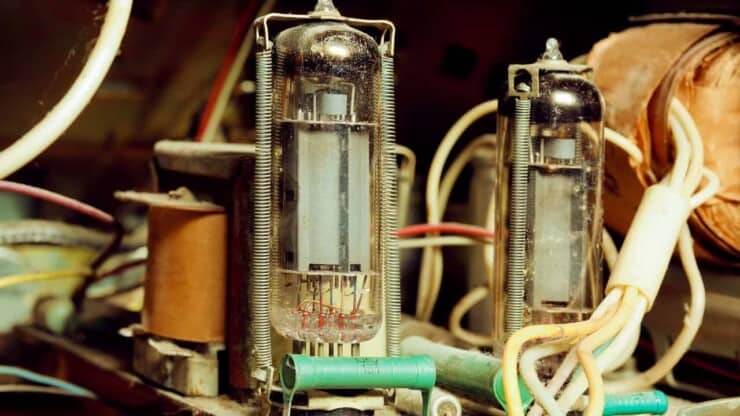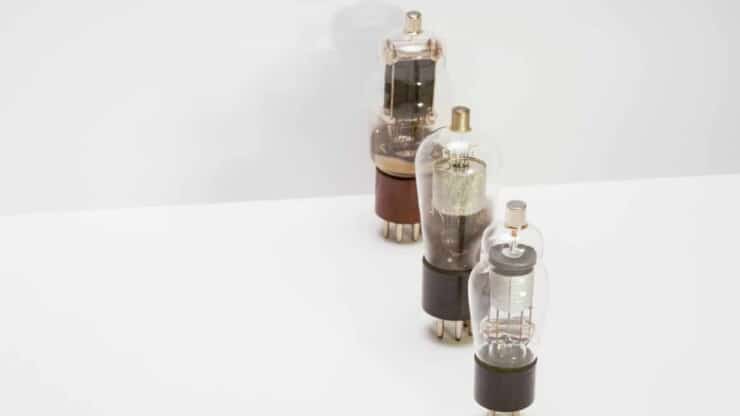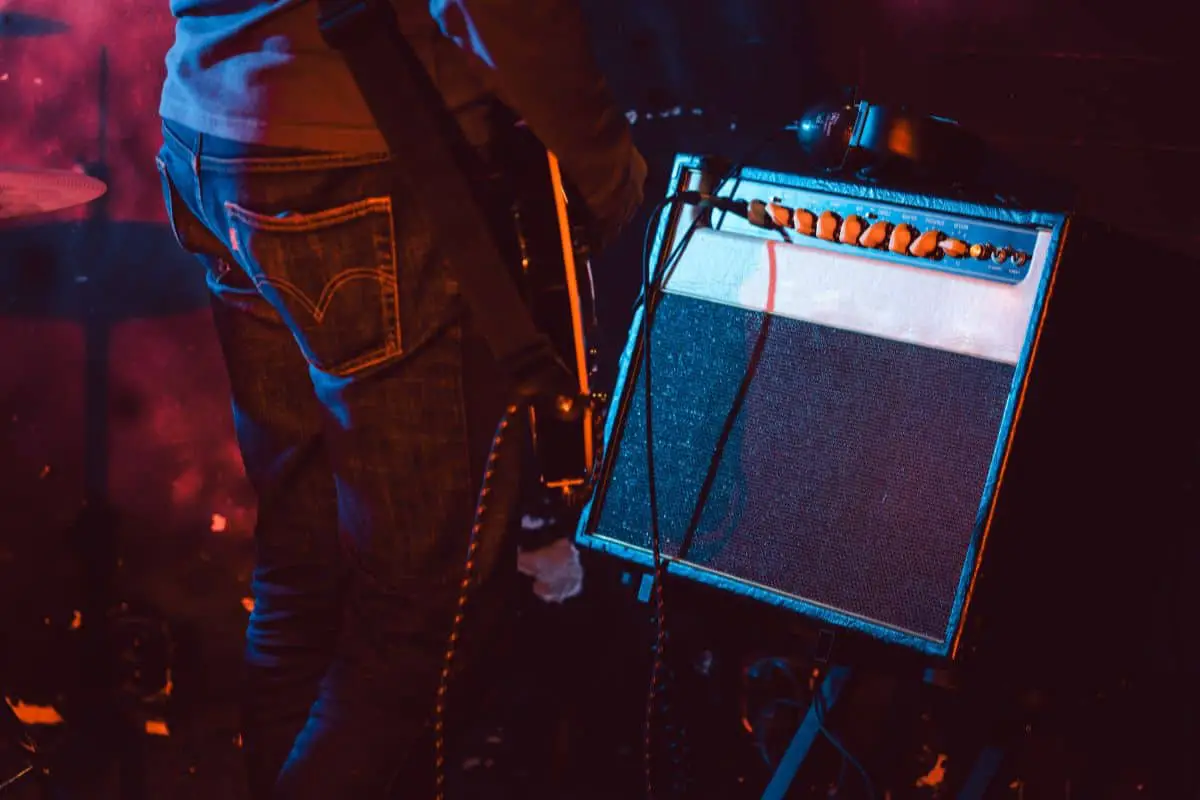Have you been hearing a crackling sound in your guitar amp, but don’t understand why it’s happening? If yes, then don’t worry, you’ll get to know about the potential reason here.
Guitar amp crackles due to a variety of reasons including faulty output line, bad soldering, an improper connection between speakers and amplifier, faulty power tube, and more.
In this article, you’ll get to know all about why does my guitar amp crackle, how to fix the tube amp crackling when playing issue, and the reasons why guitar amp crackles when adjusting volume among other. Continue reading to get all the answers that you’re looking for.
Why does my guitar amp crackle?
The key to resolving the crackling issue would be understanding why is my guitar amp crackling in the first place. There could be a lot of reasons for tube amp crackling when playing, and you’ll need to know about it.
Is the crackling getting louder after you turn on the amp? In most cases, the volume will remain the same regardless of how loud you’re turning the knob. It might even vary to be an occasional popping or steady crackling sound. Unless the sound is fading in and out, you’re free to proceed to the next step. Studying the sound narrows down the possible outcomes. Another issue will be in knowing if the crackling problem is coming from the speaker. Turn off the volume settings like delay and reverb and turn on the amp to the fullest.
Are you getting any sound? If not, then you’ll need to turn on the volume setting controls. If you still hear the crackling, you should move on to the fixing part. By following a few simple steps, you’ll be able to solve this crackling issue easily. But before resolving the crackling problem, it’s important to know about the different types of crackling. This could help you know why does my tube amp crackle.
Rumbling crackle
If the sound that you’re hearing is like a rumbling sound and the speaker is crackling, then it could be because of a faulty output tube. If you’re getting this type of crackling, shift to a new set of spares.
Lightly hit the amp tubes inside with a drumstick or a pencil. You can even do this with a wooden tool or a non-electro-conductive tool. The tube that is producing the crackling sound is the culprit. You’ll need to replace the faulty tube for solving this issue.
Another great option would be to replace the entire batch of power tubes in your tube amp. It’ll be ideal for maintaining your power tubes of the same age and same brand.
Glassy or high-pitched crackling
Is your guitar amp crackling when playing and is higher, pitchy, and glassy? If so, then it might be due to a faulty preamp tube. The glassy sound will come across like a broken sound of mid to high-range frequency. For confirming the defect, you should hit the tubes with a wooden stick one at a time.
Start off with the closest tube to the output tube. If one of the tubes crackle with a glassy sound, it’ll likely be the source of the issue. You’ll need to replace that tube.
Loud static crackles
When you’re hearing static sound from the amp, you should check all the amp’s connections. Moreover, have a look at the speaker and input cables along with the tube socket. The static sound will be due to an oxidized, rusty, and dirty connection. You’ll need to clean out all the parts thoroughly for that.
Random crackles and pops
If your guitar amp is producing a popping sound, it could be occurring because of faulty power amps. You’ll be hearing a popping effect in this sound. For solving this issue, you should swap one after the other with a spare tube. You can even have a technician check the cathode resistor or plate in the preamp.

Connection between the speakers and the amp
Sometimes, the problem could be minimal and have a simple solution. The connection between the amp and the speaker might be shoddy and cause interference. In that case, you can replace the cable or wire between the speaker and the amp to solve the problem.
It can be quite frustrating to pull apart your amp bit by bit, replacing different components, only to discover that the entire issue was just bad wiring. This is one of the first things to check when you hear crackling in the amp.
Bad soldering
Even if a small piece of solder comes loose, it can cause issues by providing an intermittent connection. You should have a close look inside and then check for any visible soldering. See if any of the solders have become loose or appear to be “cold” solder joints.
You can easily tell a cold solder joint by looking for contacts that appear rough on the surface or “lumpy”. In cheap amps that are typically made using a printed circuit board, there is lower quality workmanship in manufacturing. The subpar quality can often result in less-than-ideal soldering jobs. Bad soldering will be something to look for and troubleshoot if your amp is producing a crackling sound.
How to fix tube amp crackling when playing
If your tube amp has started crackling suddenly, you’ll be likely to find yourself getting frustrated quickly. Many things could result in this annoying issue, and isolating the problem might be difficult. Here, you’ll get to know about the step-by-step instructions to help you figure out what’s causing this crackling sound and how to fix it.
Safety first
When you’re dealing with tube amps of any kind, it’ll be important that you take precautions. Otherwise, you might end up getting burned by hot tubs or, worse, get electrocuted. Be cautious when you’re working with the materials inside the tube amp. You should start by wearing eye protection and a pair of heat-resistant gloves. If you’re a novice, you’ll need to either take help from an expert or do it under their guidance. You should have at least one expert observing and assisting you when you start working. It isn’t worth risking your health or even your life just to save a few dollars.
Here are a few precautions that you need to take before you start the process –
- Keep one of your hands in your pocket when probing a live amp. It’ll help prevent the current from passing through your body.
- You shouldn’t wear any type of jewelry. Gold and silver might be great conductors of electricity and heat, but they’re risky.
- Never bite a solder as it could lead to ingestion to kill your brain cells.
- Before you solder, remember to unplug the amp. You shouldn’t only rely on the switches.
- Installing tubes with power on could break the glass and produce high electricity.
- Make sure that you’ve turned off the power of your amp. Moreover, remember to remove the capacitor discharging jumper wire before you repower the amp.
Once you’ve taken the necessary precautions needed, you can move on to the next steps.
Study the problem to understand the cause of it
Once you’ve considered all the precautions, it’ll be time to start working with the guitar amp. To solve the problem, you’ll first have to study it and get to the bottom of it. Ask yourself different questions about the noise and when it occurs.
Is the crackling getting louder as you’re turning up the amp? More often than not, it’ll stay the same volume, no matter how loud you’re turning up the knobs. The crackling might be an occasional pop and crack, or even a steady droning. Studying the problem and how/when it is occurring could help you narrow down the cause of it. Is the crackling coming through one channel or through all the speakers? This is another important question that you should consider when looking to find the cause and solution.
This guide will be looking at the crackling coming through your guitar amp’s speakers. If you’re worried about the crackling coming from the tube when you’re turning on/off the amp, this is a normal sign that they’re warming up and changing temperature. Typically, this isn’t a problem that needs to be addressed. However, if the crackling is coming through the speakers, there are certain quick fixes to know about.
The quick fixes to crackling
Troubleshoot the problem by turning down any internal effects that your amp has like reverb or tremolo. Turn down all the volume controls too. After that, hit the top of the amp with moderate force.
In case you’re getting the sound, study it, and try the responses mentioned below. If the sound doesn’t occur, try to turn up the volume controls to the settings that you normally use and then try out this method again. In case it doesn’t occur, there are some quick fixes that you should give a try.
- Rumbling in the amp – If the sound is rumbly, your amp might have a faulty output tube. You should replace the amp’s power tubes using a set of matched spares. If the problem still persists, put back the original tubes and troubleshoot.
- Glass or high-pitched – In this case, you’re likely to have a faulty preamp tube. You should check by tapping each tube with a pencil. Start working away from the tubes closest to the output tubes. If any of them produce any unwanted noise, immediately replace them. This could resolve the issue quickly. Otherwise, you can continue this process and replace the other preamp tubes that are causing the issue. This can even be used for the output tube if it is the reason the guitar amp crackles when adjusting volume.
- Loud and static – Check all the connections in your amp. Check the tube sockets, speaker cables, and input cables, and clean them all thoroughly. Having a dirty, oxidized, or compromised connection in your amp could cause static sounds.
- Random crackling and popping – If this is happening, your amp likely has faulty preamp tubes or power tubes. Try to swap them with spares one by one, or you can even get them all replaced in full. If replacing the tubes doesn’t resolve the issue, get a qualified technician to look at the problem.
Clean the connections
First, you’ll need to check all the connecting cables to the tube amps and clean them properly. A dirty connector will be the most common reason for crackling sound in tube amps.
Unfortunately, the cause might not always be so simple, but you should still give it a shot. Even if the connectors aren’t that old, having a poor-quality connector could cause trouble anyway. Once it is cleaned, plug the connector back in and see if the issue is still there. If it’s still persisting, try to swap out the connectors to see which connector is causing the problem. Once you have ruled out the connectors, move forward with other viable solutions. Once you have ruled out your connectors, you can move forward with the other potential solutions.
Check the power
There might be some interference with your power source. For checking this, isolate your guitar amp’s power to a different circuit and see if the issue is still there. If it does, then there will be something in your home’s power grid that is interfering with your amp. Hopefully, you’ll have the option to use the new, unaffected circuits from here on out. Otherwise, the solution will be to figure out the issue with the circuit. Then, you can fix it and return the amp back to its original plug.
Look at the tubes
A poor tube connection might be the reason for the crackling sound that you’re hearing. Sometimes, just pulling on the tubes could help re-seat them better. Moreover, it’ll give them a better connection while resolving the problem.
The crackling might even be caused by bad tubes. In that case, you’ll have to try and swap them out. Hopefully, you’re having some spares on hand for testing purposes. Occasionally, you might even find that swapping the position of the current tubes can resolve the crackling problem.

Generally, if the crackling occurs at random times, the first thing that you should do is look at the tubes. The same will apply to crackling or popping that occurs when you aren’t even playing music through the guitar amp. Go through each preamp tube one by one and then replace the tubes to see if it has stopped the crackling from occurring. This could take a lot more time to test thoroughly if the crackling is occurring at random. You might need to swap out one tube and then wait for hours to see if the crackling is happening again.
Sometimes, you might go through all the tubes, and they don’t seem to be the reason for the crackling sound. If that happens, you should get matched spares and then replace all the output tubes.
If the solutions don’t work for your guitar amp, then you shouldn’t hesitate in calling an expert technician to take a look. The problem could be a cathode resister or a failing plate in the preamp, and they’ll resolve these issues.
Other common problems with a guitar amp
If your guitar amp is giving you trouble, then it could be due to other common tube amp problems as well. Here are a couple of solutions for common tube amp problems.
Sound cutting out
In case your tube amp’s sound seems to be cutting in and out when using it, the first thing that you should check is the tube sockets. You should also look for the connections and thoroughly clean them. It means spraying the electric cleaner into the jack, cleaning the ends of the cable, and plugging them in/out ten times.
No sound at all
In case your tube amp has gone silent, it’ll be worth checking your speaker. An open speaker connection will be the first potential culprit that you should consider if your amp has gone silent.
If you’re still experiencing issues after trying the proposed solutions, it’ll be worth taking your guitar amp to an expert. Further, you can also use this problem as an opportunity to learn.
Best practices to keep your guitar amp in premium condition
Ever since the invention of the tube amp, it has been a highly in-demand part of a guitar rig. A guitarist normally expects their tube amp to have an expected life of up to 10,000 hours of use. Some guitarists tend to routinely replace tubes once every couple of years, whether there’s a problem or not. Meanwhile, other musicians might not do anything to their amp until it gives up. Car maintenance will be a good analogy. Some people like to get the oil changed every 3000-3500 miles as recommended. Meanwhile, some people wait until their car is on the verge of falling apart before getting it fixed.
Some musicians build a superstitious attitude toward their tubes and refuse to change them until they absolutely need to. Ultimately, the tubes aren’t just a part, and they’ll require replacement at some stage.
Now, the question arises, do you want it to happen at some random moment if a failure occurs? Or will you be prepared and change them during scheduled maintenance?
Your tubes should normally function for around 10,000 hours with regular usage. Whether you like it or not, there’s a chance that they could fail at any time after that. If you are proactive and regularly have your amp worked on (at least once every year if you gig out consistently), you will likely continue having amps that work night after night and remain crackle-free.
Revert to an expert technician if everything else fails
A qualified technician will be able to listen to even the most minute amp crackle. Moreover, they’ll also instantly know where the problem lies or will have a better idea of where to start looking. A capable technician might even suggest that spending more money fixing a cheap one, might, wouldn’t be a good investment. The reality might mean that the money spent on different parts and labor fixing the amp might be better off if it went towards purchasing a brand-new amp. Similar to determining when a car gets totaled, sometimes, the amp must be retired if the cost of resolving the problem outweighs the functionality and value of the amp.
Conclusion
Thank you for reading. Hopefully, now you know a lot more about why does my guitar amp crackle, how to fix the tube amp crackling when playing issue, and the reasons why guitar amp crackles when adjusting volume among others. Guitar amps producing crackling noise is more common than you may think. A guitar amp can produce a crackling sound due to various reasons including a faulty output line, a faulty power tube, bad soldering, an improper connection between the speaker and the amplifier, and more.



